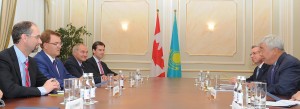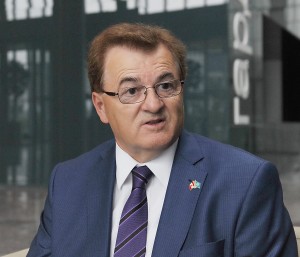ASTANA – A Canadian parliamentary delegation led by Leon Benoit, co-chair of the Kazakhstan-Canada Friendship Group and Chairman of the Committee on Natural Resources of the House of Commons, visited Astana on Sept.10.
 During the visit, which also took the Canadian delegation to Almaty earlier, the Canadian parliamentarians also met with Chairman of the Senate Kassym-Jomart Tokayev, Chairman of the Mazhilis Kabibulla Dzhakupov and Foreign Minister Erlan Idrissov to discuss bilateral cooperation in a wide range of areas.
During the visit, which also took the Canadian delegation to Almaty earlier, the Canadian parliamentarians also met with Chairman of the Senate Kassym-Jomart Tokayev, Chairman of the Mazhilis Kabibulla Dzhakupov and Foreign Minister Erlan Idrissov to discuss bilateral cooperation in a wide range of areas.
Following their meetings, Leon Benoit shared his vision of Kazakh-Canadian relations in an interview with The Astana Times. The head of the Canadian delegation emphasized that Kazakhstan and Canada have strong diplomatic ties and share many common interests, which suggests huge potential for further development of cooperation in a number of areas.
What are the first impressions of Kazakhstan and your assessment of preliminary results of your visit?
Kazakhstan is a beautiful place to come. I am so impressed with the cities, the landscape and people. There are some obvious areas where Canada can expand partnership with Kazakhstan. To me, the obvious ones are agriculture, production, processing and other value added sectors in agriculture. In agriculture an opportunity lies in stock breeding, animal genetics. Actually that’s happening now but that could be expanded way beyond what it is. Another area is mining, of course. There really are opportunities across all sectors of economy. I guess what will determine more than anything else how fast this happens will be things like a regulatory system you could rely on, security in investment, so that companies are confident that their investments would be secure. Another is skilled workers. Some of the very top technical people would come from Canada but others would be counting on having people trained here. These are the things that companies need. There is no doubt that Kazakhstan has made a lot of progress in all of these areas and as we’ve been told it seems there are still ways to go. But that doesn’t mean that Canada can’t continue to increase its investment and partnership with Kazakhstan. I also believe that terrific tourism industry should be developed in Kazakhstan because this is truly a gorgeous country and it should be a prime target for tourism.
How did an idea come up to establish Kazakhstan-Canada Friendship Group?
 Well, I initiated an idea on the Canadian side, but quite frankly your Ambassador to Canada, Konstantin Zhigalov, is very active, he is an excellent ambassador and excellent representative. He talked to me on several occasions. I would say he was the one who encouraged us to make the group more active and then come visit Kazakhstan. And I accepted his offer immediately.
Well, I initiated an idea on the Canadian side, but quite frankly your Ambassador to Canada, Konstantin Zhigalov, is very active, he is an excellent ambassador and excellent representative. He talked to me on several occasions. I would say he was the one who encouraged us to make the group more active and then come visit Kazakhstan. And I accepted his offer immediately.
Parliamentary cooperation can be bilateral, but it can also be multilateral. The first thing that comes to mind is the OSCE Parliamentary Assembly. How do Kazakhstan and Canada cooperate under the auspices of such multilateral parliamentary organisations?
I have been a member of Canadian NATO Parliamentary Assembly delegation for some time. We do have thirty five observer countries to NATO PA as well [Kazakhstan has the status of Parliamentary Observer in the NATO PA]. But there are many other groups where Kazakhstan and Canada can cooperate. I would stress that just very few years ago probably there was very little knowledge of each other but over the past couple of years in particular there’s been a real focus on Kazakhstan. We’ve seen four ministerial visits in the last two years or so. That shows a real interest and we had several delegations from Kazakhstan visit Canada with different business interests in mind. In summary, I would say that the relationship between Kazakhstan and Canada are at the early stages but that they are growing rapidly now. I think we are going to see great things in the years ahead.
You pointed out the importance of tourism. For a Kazakh national getting a Canadian visa is quite an issue, as we have to go to Moscow to obtain it. What are your plans in this field?
The first thing is that there are delegations that can get visas here in Kazakhstan, but generally that’s right. The embassy that issues visas is in Moscow right now. And these are issues that have been brought to our ministers’ attention by your ministers. I was aware of them before. I think parliamentarians may help to move along these issues. I know the Canadian Ambassador to Kazakhstan really wants to see visa process sped up, so do I, and I will talk to the appropriate ministers about it. In Canada, we have two MPs sitting at each desk and my desk mate is the Immigration Minister. That certainly is an ample opportunity to talk to him on this issue. We have seen a lot of very positive reaction to small groups of MPs promoting issues like this. Our government is very responsive in this. I’m hoping we can do something about it, which will cost more money, but the payoff will be stronger relationship and more trade, better business.
Another important issue for Kazakhstan is Canadian peacekeeping experience. In this area Canada is one of the global leaders and has long and proud history of peacekeeping. Kazakhstan has just made a decision to send twenty peacekeepers to various hot spots. Can Canada share its peacekeeping experience with Kazakhstan?
Absolutely. Canada is, first and foremost, a country that really wants peace. But the reality is that strong army is required to make peace in most cases. Over the last ten years we’ve improved the quality of our military dramatically in terms of quality, numbers and equipment. We’ve spent tens of billions of dollars on new equipment and our soldiers now are among the best trained on Earth. Part of what makes them good in peacekeeping is when Canadian soldiers went to Afghanistan or to the Balkans they worked with the local people much better than soldiers from most other countries. In fact, the Americans have learned a lot from Canada while in Afghanistan. Of course the next step is the military training people in various components of civil service, along with building a judicial system. Canada is involved all of those things. I think we do have some expertise to share and we are happy to do that. But there’s one thing that we won’t do when it comes to peacekeeping. Never again will we put our men and women into a situation like we did in Africa and in the Balkans while cooperating under the United Nations rules. They have rules of engagement that are completely inappropriate for the situation. Our men and women can’t stand there literally and watch women be raped and people be killed. The United Nations rules they are operating under allow them to do nothing. Eventually they just did it anyway but never again are we going to put our men and women at that kind of situation. We will continue offering services as requested as advisors and we will work with other countries, who have very professional armies and who operate under rules that are reasonable and I am sure in the future we’ll be working with Kazakhstan.
The trade turnover between the two countries does not exceed US$3 billion. Will you agree this is not the limit? What do you think should be done to increase the trade volume?
I think we have to go above that. To me that’s just a starting point. Most of that is investment, last year investment accounted for US$2.4 billion, which is good but it’s worth looking at our two countries, at the incredible fit that we are. I feel at home here, the landscapes are the same as in western Canada. People are so friendly in Kazakhstan, and I’m not just saying that. People here are really so friendly and so open. That makes you want to do business here. I believe the trade volume will increase but if it’s going to increase as fast as I would like to see it, then the same things that I mentioned at first have to happen. Kazakhstan will have to have a regulatory system that’s completely reliable and the rules are respected by both parties involved. Secondly, investment has to be protected. I know Kazakhstan unfairly takes a negative hit on that because of what happened in Kyrgyzstan, which has nothing to do with Kazakhstan. But still business doesn’t know that. So, we need the skilled workers and that is a challenge to Kazakhstan to train skilled people in certain areas. And that also creates opportunity because Canadian companies are very good companies to work for.
Bilateral relations today require a solid legal regulatory framework. Our MPs are working in close partnership with MPs of Canada. A number of agreements have been signed recently between our countries, including in the spheres of nuclear energy, agriculture, double taxation elimination and others. Is there anything in particular that you think would speed up the process of economic integration and economic development between the two countries?
I think Kazakhstan and Canada are signing foreign investment protection agreement (FIPA). Canada has forwarded its position to Kazakhstan and now it’s up to Kazakhstan to respond to that. This takes some time. Once the FIPA is signed things will move ahead. I think this is a real opportunity for further development of economic cooperation. And quite frankly agreements are important, but I think what’s going to help move things along over the next years is having success on the part of five or ten major projects, companies that are coming to Kazakhstan, hopefully Canadian companies, showing success. Then other companies see that and they will want to be the next. Visible successes are really important here.
Today, 170 Canadian companies have been registered for business in Kazakhstan, while 40 Canadian companies have opened their direct branches. So, this is not the limit, do you think?
This is just a good start. And I suggest in all different sizes from the big companies like uranium company that’s been operating here for some time down to some medium-sized companies (who are often much more innovative than larger companies) and even to some of our most innovative companies that are very small and ready to do business around the world. These are the ones who can probably make as much difference here in Kazakhstan as any other.

